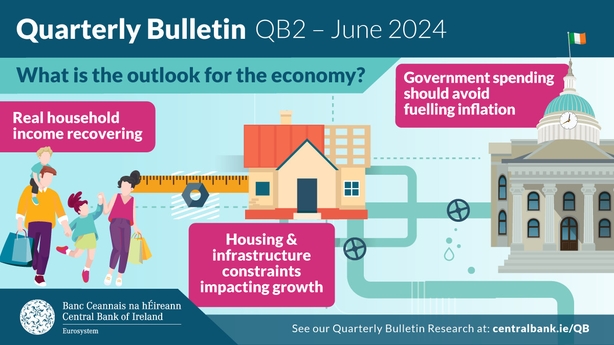The Central Bank has reduced its forecasts for economic growth this year.
In its latest Quarterly Bulletin, the bank predicts that Modified Domestic Demand will expand by 2.1% in 2024, down from its forecast in March of 2.2%.
It has also cut its forecast for Gross Domestic Product to 1.8%, down from its previous projection of 2.8%.
The bank has revised upwards its projection for growth next year, forecasting that MMD will increase by 2.5% in 2025 up from its previous forecast of 1.9%.
It has left its projection for 2026 unchanged at 2%.
In its outlook, the Central Bank warned that escalating geopolitical tensions could impact supply chains.
Inflation
On inflation, the Central Bank said that energy, food and non-energy industrial goods prices, which are determined more by global market conditions, are projected either to rise at a much more moderate pace or to decline.
As a result, it is forecasting that both headline and core measures of inflation are likely to ease toward and hover around 2% this year and next.
It is also highlighting that the outlook for consumer spending is sensitive to potential changes in household savings behaviour, with the pick-up in consumption appearing to be weak relative to the rise in incomes.

Public finances
When it comes to the public finances, the Central Bank said that it would not be appropriate to continue with an expansionary fiscal stance and that a continuation of spending increases without compensating tax measures could contribute to overheating risks.
"The issue here is how much we try to do too fast," said Robert Kelly, director of economics and statistics at the Central Bank. "We do some scenario analysis where you start to address some of this capital spending needed for emissions targets, but also do the higher level of current spending [on cost of living mesaures].
"What you see is raises demand in the economy, puts wage pressures up, and because we might be more unique across the euro zone in this, we start to see our competitiveness eroded."
Instead priority should be given to addressing capacity constraints in areas like housing, water, energy and transport.
The expected shortfall in spending on decarbonisation measures also needs to be addressed, Mr Kelly said.
Doing so while also keeping a lid on spending could be a challenge, however the Government's limit of a 5% increase in Budget spending is on a net basis - meaning higher or broader taxes could still allow for additional investment.
The Central Bank report also highlighted the concentration surrounding corporation tax receipts, with 10 large multi-national firms accounting for 52% of these receipts in 2023, and 10% of total government revenues last year.
"The narrowness is one of the main risks we'd see," said Mr Kelly.
We need your consent to load this rte-player contentWe use rte-player to manage extra content that can set cookies on your device and collect data about your activity. Please review their details and accept them to load the content.Manage Preferences
The Government's recently established funds are designed, in part, to take some of that extra corporation tax out of day-to-day spending, however Mr Kelly said more still need to be done to ensure the Exchequer tax take remains viable.
"The funds are a good way of putting that money away to address demographic issues down the line and also, in part, to address the climate needs," he said.
"But what we've seen over the past couple of years is the Budgets - if you take away the excess corporation tax that can't be explained by the domestic economy - we're running a decifit. And we'll have run a deficit for the past 17 years, and projected to run for the next three."
It added that a slowdown in exports arising from sector-specific issues in the pharma and tech sectors in 2023 appears to be waning and stronger growth in net exports is anticipated from 2024.

Housing shortages
The Central Bank said that addressing housing and other infrastructure constraints are necessary to maintain sustainable growth in living standards.
On residential construction, the bank notes that while there have been increases in the numbers of housing units completed in recent years, there is uncertainty around the timing and scale of future increases.
"Sustainably addressing infrastructure constraints in housing, water, energy and transport should be priorities over the medium-term," the Central Bank said.
Robert Kelly said that the Irish economy is expected to continue to grow at a moderate pace until 2026.
"Inflation is returning to sustainable levels as global influences on Irish inflation have eased, but domestic price pressures remain high," Mr Kelly said.
"As economic activity is expected to be broadly in-line with its medium-term potential, policy attention needs to more firmly turn to bolstering that potential by addressing capacity constraints and reducing structural vulnerabilities in the economy and public finances," he added.
The Central Bank said that the planned creation of the Future Ireland Fund and the Infrastructure, Climate and Nature Fund with the use of excess corporation tax receipts is welcome, but that they should not be seen as a solution for the challenges and opportunities arising from the demographic and climate transitions, nor the critical housing and related infrastructure gap that exists.
The Minister for Finance has welcomed the Central Bank's latest report on the economy but said he was not ruling out tax cuts or spending increases in the Budget despite the bank's warnings on inflation.
Speaking on his way into today's Cabinet meeting, Michael McGrath said the Central Bank was right to highlight the risk of government policy adding to inflationary pressures.
But he added that he has indicated there will be within the parameters yet to be agreed for the Summer Economics Statement scope for changes to personal taxation and also for improvements in social welfare.
"That can be done in a manner that is consistent with the prudent management of the public finances," he added.







